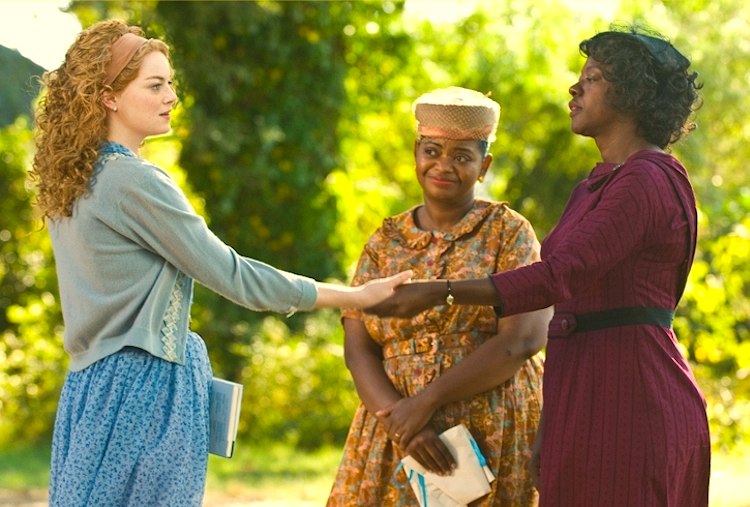
By Govindini Murty. The Help has been a truly surprising hit this summer. In a season full of alien invaders and spandex-clad superheroes, audiences are flocking to see a female-driven domestic melodrama. Based on Katherine Stockett’s best-selling novel (with over five million copies sold to date), The Help dramatizes the plight of black maids working for white families in the racially divided society of early ’60s Mississippi. The film features engaging performances from a talented cast that includes Viola Davis, Octavia Spencer, Emma Stone, Allison Janney, Jessica Chastain, and Cicely Tyson. What truly makes the film appealing, though, is its heartfelt, optimistic spirit, which ultimately suggests that reconciliation is possible even in the midst of the worst racial intolerance.
The Help is a welcome real-world antidote to the extravagant CGI fantasy films of this summer. It may not depict earth-shaking cataclysms, but the real life injustice the film depicts is just as consequential. The Help shows what happens when people allow themselves to be co-opted by group pressure into acting in inhuman ways. The white women in The Help may not all be naturally evil, but through social pressure they acquiesce to evil behavior. Their weakness, malice, and cowardice is motivated by the most mundane of reasons: the desire to be included in a bridge party, to get a medal from a women’s organization, to have the best dress or the best cook in town. Yet the decisions they make have a catastrophic effect on their fellow black citizens, depriving them of their civil rights, their livelihoods, their dignity, and even their families and their freedom.
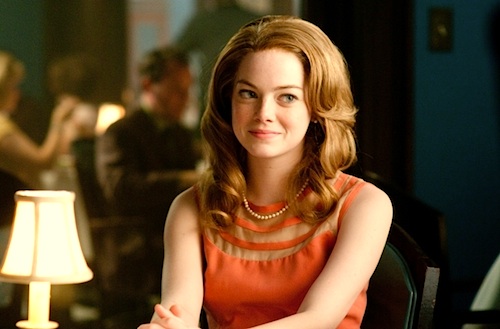
The Help centers on the story of Eugenia “Skeeter” Phelan (Emma Stone), a well-to-do white girl who returns home to Jackson, Mississippi after graduating from college. Unlike her childhood friends who have gotten married and had children, Skeeter dreams of pursuing a career as a writer. She’s applied for a job as an editor at Harper & Row in New York, but when she’s turned down, Skeeter interviews at the local newspaper and is assigned the task of ghost-writing a house-cleaning column. Skeeter’s desire to write bewilders her mother and her friends, all of whom are apparently satisfied with their lives as decorative society wives. Skeeter’s wish to have her own career is one of the most appealing aspects of the film, one that pretty much any woman can identify with. It doesn’t hurt that the New York publishing world is depicted in such a glamorous way in the film, with the editor Skeeter writes to, Elain Stein (Mary Steenburgen), living a life of independence with a fabulous office and apartment, dressed in sleek black cocktail dresses and surrounded by handsome, well-tailored young men.
In any case, since Skeeter knows nothing about housecleaning, she turns for advice to the black maids who work for her friends. Skeeter starts talking to Abileen Clark (Viola Davis) and then meets Abileen’s best friend Minnie Jackson (Octavia Spencer). As Skeeter gets to know the maids, she witnesses first-hand the humiliating way they are are treated by the women who are her friends. In particular, Skeeter sees that her childhood friend Hilly Holbrook (Bryce Dallas Howard) has become a hectoring full-time racist who uses her position as head of the Junior League to bully the young women of Jackson into treating their black maids abusively. Skeeter is deeply pained by this. You see, Skeeter herself was raised by a black maid, Constantine, who was actually more of a mother to her than her own mother Charlotte. Constantine has mysteriously disappeared, and part of Skeeter’s quest to record the lives of the maids is motivated by her own wish to make sense of the central role that Constantine played in her life – and to figure out why Constantine would have left her family.
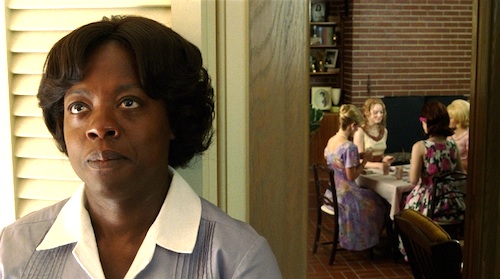
The Help thus explores the central dichotomy that faced many black women in the South when they were forced to work as maids because of a lack of any other opportunities. These hard-working and dignified women did the valuable work of raising the white children in their communities, yet were treated as third-class citizens who couldn’t sit on the same bus seats, eat in the same restaurants, drink from the same water fountains, send their children to the same schools, or walk in through the same entrance in a movie theater as the whites they had raised.
Such black women were exploited by a monopolistic white power structure in the South that apparently couldn’t survive if it allowed free competition and free enterprise in the black community. Thus, black Americans who could have succeeded on their own merits were systematically restricted to low-paying, menial labor, physically assaulted if they attempted to register to vote, denied loans to send their children to college or to start businesses, subjected to police brutality, and robbed of their constitutional rights. This was contrary to both the founding principles of America and to the Enlightenment ideals that form the backdrop of our Western political tradition.
The Help vividly depicts the grinding reality of this kind of racism on the African-American community. You can literally see the years of accumulated pain in Viola Davis’s eyes as she plays Abilene Clark. When Skeeter asks Abilene what it was like to raise seventeen white children only to lose her only son to white negligence, Davis hardly has to say anything for you to understand what she feels.
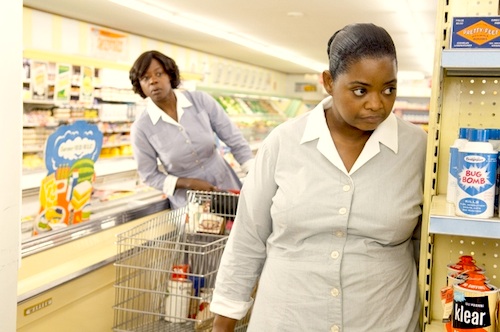
It’s a testament to the African-American community that it was able to conduct itself with so much strength and good cheer in the midst of this daunting adversity. The plentiful humor in The Help reflects this reality. Far from trivializing the issue of racism (as some have charged), the humor in The Help is a crucial coping mechanism, allowing the characters to survive situations that would otherwise be unlivable. It also gives the talented actresses in The Help – in particular the hilarious Octavia Spencer (on whom the character of Minnie Jackson was based) – the chance to shine in roles that are both dramatic and comedic.
As the film progresses, Skeeter is impelled by the injustice she sees to write a book – to be titled The Help – that will tell the maids’ stories from their point of view. However, Abilene, Minnie, and the other black maids are afraid to speak to her because they’re worried about the very real threat of retaliation from their white employers. It’s only when a series of racial incidents occur that are so unjust and cruel that the black women finally agree to speak with Skeeter and be interviewed for the book. When the book comes out and the women of Jackson, Mississippi sit down and read it, it has a sobering effect on them. Behavior that the white women would never have admitted was wrong in their own lives they suddenly recognize as wrong when it is recounted in the pages of a book (this is the value of writing). And while most of the white women don’t immediately alter their outward behavior, a few of them are awakened to their better natures and begin to stand up for better treatment for their black fellow citizens. The implication is that if good people keep standing up in this manner, the entire system of Jim Crow racism will eventually come crashing down.
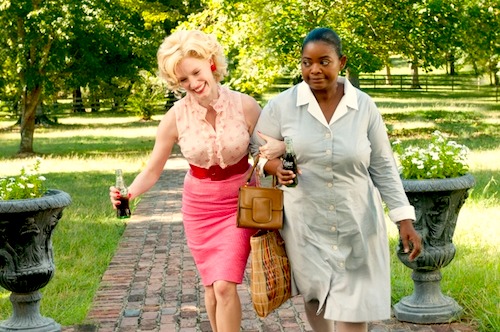
One of the most telling scenes in The Help is when Skeeter reads out the actual laws of the state of Mississippi in the early 1960s. As she recites an appalling litany of racist regulations restricting every aspect of life for black citizens, there was one law in particular that horrified me even more than the rest. This was the law that made it illegal to even write or talk about social equality. Thus, as Skeeter states it, by even sitting with Abilene and Minnie and recording their stories, she and the black maids are committing a crime. Mississippi thus turned free discourse – the last refuge of the persecuted – into a ‘thought crime’ of the kind Orwell described in 1984. It apparently wasn’t enough for the Mississippi government to restrict its citizens’ actions; they also had to control their minds and their speech. This was one of the most affecting scenes of the film for me, because as much as I was aware of the institutionalized racism of the South in this era, I was still shocked when the actual laws of the state of Mississippi were read out. It’s hideous that laws that were so unconstitutional existed in large portions of the South up through the early 1960s. Even worse, when Skeeter is caught carrying a copy of these laws in her purse, the racist Hilly scolds Skeeter about the trouble she will be in if she’s caught reading them. It’s unbelievable that not only were these laws racist, but that you could be denounced for even reading them.
Hilly also repeatedly demands that Skeeter cooperate in publishing a racist initiative of hers in the Junior League’s newsletter. When Skeeter refuses, it ignites the film’s main conflict between the vengeful Hilly and the allied trio of Skeeter, Abilene, and Minnie. Hilly fires Minnie in a spiteful rage, and then lies and tells every other white family in Jackson that Minnie had stolen from her. Minnie is now unable to find work anywhere. Minnie is forced to take her own teenage daughter out of school to go work as a maid to earn money for the family – a choice that anguishes her because she wanted her daughter to get an education and to have a better life than her. Indeed, throughout the film, we see the efforts of black women to educate their children and improve their family’s lot in life stymied by the white southern establishment. Eventually, Minnie gets a job with a friendly white woman who lives on the outskirts of town, Celia Foote (Jessica Chastain). Celia herself is an outsider because she’s not from Jackson and is considered ‘white trash.’ The real reason she’s ostracized, though, is because she’s beautiful, sexy, and is married to the handsome former boyfriend of the jealous, vain Hilly.
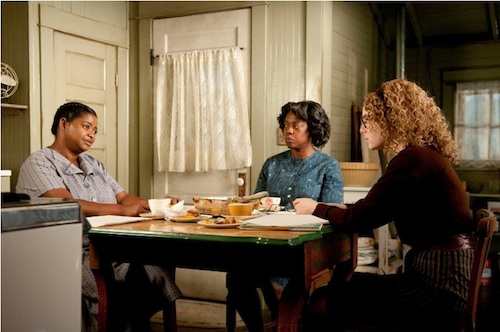
Thus, by including the Celia character in the story, the movie shows that the intolerance behind racist behavior easily translates into intolerant behavior against others – including white women – who don’t ‘fit in.’ Celia is treated cruelly by Hilly because she doesn’t fit into the extremely narrow, provincial strictures of Jackson society. Skeeter is badgered by her family and by her friends because she chooses a career as a writer over getting married and having children. And, of course, Abileen, Minnie, and the rest of the black characters in the film are treated badly simply because of the color of their skin. However, it is these very ‘outsiders’ – Celia, Skeeter, Abileen, Minnie – who are able to think clearly as individuals and do the morally right things in the film. I think that’s a valuable lesson for today – whether one is dealing with racism, sexism, or any other form of intolerance that requires one to break from the group and stand up as an individual.
The Help takes these very serious issues and makes them accessible to mainstream audiences. The film is appealing to look at with vivid cinematography and colorful art design that makes the most of ’60s era fashions, cars, and interior decoration. The film establishes a stark visual dichotomy between the white women who are dolled up with bouffant hair, elaborate makeup, and colorful crinolined dresses, and the black women who are forced to wear sober, dowdy maid’s uniforms that obscure their individuality and their femininity. Thus, the colorful design ultimately has an unsettling effect, for the people who are the best-dressed in the film are also the ones who behave the worst. This visual scheme may be a little simplistic (was every Southern white woman so well turned out?), but overall it works to drive the film’s central message home.
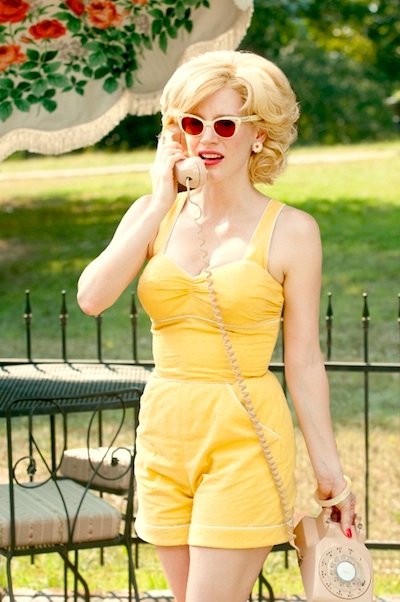
Also, while Tate Tatum generally does a strong job directing the performances, there are times when I would have liked to have seen more nuance in the characterizations. For example, the young white women are depicted as such a bunch of Stepford Wives that it’s hard to believe at times that Skeeter could ever have been friends with them. Making some of her friends a little more human would have made it all the more poignant when Skeeter has to break with them.
Critics have also charged that The Help doesn’t adequately represent the larger history of the Civil Rights movement in the South. True, the film only makes passing references to the murders, bombings, and assassinations perpetrated by those against Civil Rights, and neglects depicting the larger effort of the black community to fight back through marches and peaceful protests. One might get the mistaken impression from the film that the black community was completely unable to defend itself, and that it took a white Southern girl to bring racist abuses to the attention of the wider world. Certainly that’s a problem and I would have liked to have seen more of the real history of Civil Rights on the screen. Nonetheless, The Help does depict the more mundane reality of the average black woman in the South who, according to the Association of Black Women Historians, was 90% likely to be a maid cooking, cleaning, and caring for children in a white household. As such, though The Help may romanticize these black women as caregivers, it still serves the important role of reminding people of the very real work that they did.
A movie like The Help brings the issue of Civil Rights alive in a way that a thousand history books and newspaper articles cannot. It shows the human dimension of the pain and destruction caused by racism – or of any other ideology that treats people not as unique and valued individuals, but as anonymous, valueless members of a group. Judging people by their group identity, taking away their individuality and dignity is the first step toward turning them into anonymous ‘others’ who can then be abused and destroyed at will. (Think of how totalitarian societies would number people – literally depriving them of their names and their identities- prior to wiping them out.) That’s why whenever someone perpetrates a stereotype about anyone – either based on their politics, their religion, their ethnicity, or their sex – it’s so important to look that person in the eye and confront them about it. When faced with a real human being staring at them, it’s amazing how quickly people are shamed into doing what is right. The same is true for a film: when confronted by a well-made, well-acted human story projected onto the big screen, issues are made powerful and immediate. That’s the awe-inspiring power and responsibility of the cinema. Ultimately The Help handles that responsibility well, showing how the actions of courageous individuals over the long run can overcome the worst intolerance and lead to humanistic reconciliation and redemption.
Finally, I thought Libertas readers might find it interesting to read this statement from the Association of Black Women Historians on The Help. I don’t agree with all of their criticisms (for example, there are some positive figures of black men in the film), but this still makes for a worthwhile perspective to consider.
Posted on August 24th, 2011 at 8:33pm.
I knew there would be a ‘sequel” to “Driving Miss Daisy.” Hollywood just loves the idea of noble Negros and redemptive white folk. Are Morgan Freeman and/or Chris Cooper in this movie? Oh…their usual roles are played by women now.
Fast forward to the sequel of this film and Skeeter is a married Liberal Democrat (her husband will be portrayed by Mary Steenburgen’s husband, Ted Danson) and those evil Southern Dixiecrat women are now Republicans or Tea Party members who are working to defeat Obama, while they are not burning crosses on their perfectly manicured lawns which are tended by exploited illegal aliens.
Interesting response from the black female historians. They are right about the continued depiction of black women as mammies. Part of the secret to Oprah Winfrey’s success is that she was a mammy on a national scale. Ditto for Whoppi Goldberg (“The View” should change it’s name to “The Plantation”)
In response to the critics. the film does not have to be 100% historically accurate or depict church bombings, lynchings and MLK marches to show the truth about the civil rights era. That is, the crimes against blacks by whites were crimes against all involved.
Anton – I think you’re hysterically over-reacting. Why don’t you see the film for yourself and then judge it? It’s a peculiar inversion to get angry and assume this film is somehow about the present day and is a commentary on Republicans and the Tea Party, when it’s pretty obviously a historical piece about the real-life tragic situation in the South in the early 1960s. There’s no partisan politics in the film whatsoever, no commentary about either liberals or conservatives, even though there were plenty of opportunities to take pot shots at either side if they wanted. The film focused on the human issue of racism, and that’s where the focus should be.
As for Oprah or any other black women succeeding on TV being ‘”mammies” I think that’s incredibly insulting, whoever says it. Oprah is one of the most powerful women in the world and has done it on her own terms – her success on TV broke open barriers for both women and black Americans – yet she constantly has to deal with this sort of insult being bandied about. “Mammies” aren’t billionaires like Oprah who have their own magazines and cable networks. Is Tyra Banks also a ‘mammy’? What about the other black women who’ve succeeded on TV? It’s so bizarre to even think of successful and independent women like that.
As for your final statement, I really don’t even understand it:
“That is, the crimes against blacks by whites were crimes against all involved.”
Are you saying that white racism against blacks was also a crime against white racists? Or more generally were you trying to say that crimes against blacks were crimes against all of humanity? If the latter, then I would agree with that, but then I don’t know why you would get object to a film like “The Help” that in a humanistic and non-partisan way exposes these crimes against humanity.
Anton isn’t “overreacting”, he’s simply being PC. The fact that historically the “Mammy” role was filled by black women in the South, is supposed to be ignored, as it is now considered “demeaning”. Of course, as was noted in the film, the work kept their families from starving. No doubt Anton, thinks it would have been better to refuse such “demeaning” work and to die “nobly” of hunger. As I understand what the film was saying, it’s not the work that was “demeaning”; but how the people were treated who were performing it. They were refused the dignity and respect that honest labor should always command.
Hysterical? I guess those black historians are too. They might be a tad oversensitive, but they speak the truth. No political stance at all in the film? ALL films have a political stance…as does this forum.
Regarding Oprah, I give her credit…but she is still a mammy figure to po’ white women. Even if you don’t like it, she knows it. In fact, that is why she is where she is. She understood the need for her audience to have this sort of figure and she tapped into it very successfully, then leveraged it into the billion dollar empire you describe. Tyra Banks doesn’t belong in this conversation…unless we are talking about great looking women blessed with good genes.
You want to call me racist or PC (really?)…please go ahead. Just so you know, my family consists of many races, and my parents and grandparents were marching (and in some cases, bleeding) for civil rights long before it became fashionable. Quite a few of them had to take those demeaning jobs that Mike Giles alludes to, but they knew that dignity and honor come from within, not from what others think.
Anton- It’s ‘hysterical’ and ‘overreacting’ to immediately assume that “The Help” is some kind of anti-Republican or anti-Tea Party commentary, which was what the entire second paragraph of your initial comment was about. If there was some kind of anti-conservative bias in the movie, I would certainly bring it up, as I always do. It just bothers me that I raise the real issue of racism against black Americans, and you turn it into an attack on Republicans and the Tea Party. And who is calling you racist?! Again, you’re overreacting. Mike said you were being PC. I think he makes a reasonable point.
As for Oprah, she, Tyra Banks, Ellen, and a whole variety of other women on day-time TV all sell the same brand of self-help and gauzy uplift, yet Oprah is referred to as a ‘mammy’ by critics who want to undercut her success simply because she fits a certain physical type. I bring up Tyra Banks because she’s also a black American and the content of her day-time show is pretty much identical to Oprah’s, yet no-one would dream of referring to her in that way.
What’s a shame is that in the midst of this there is no discussion of the actual movie itself. We covered “The Help” here at Libertas because we thought it addressed an important issue and also because the film is proving to be wildly popular with audiences and may just win a number of Oscars in a few months. The film is obviously striking a very positive chord with the public, and rather than immediately denounce it as being part of some wicked anti-conservative Hollywood conspiracy (which it isn’t), we thought it would be more interesting to discuss the film itself.
On your account, the Help sounds like an orthodox restatement of the official and approved views of race in the United States. I’m sure its boring pieties are relieved by all the art that Hollywood can muster. Patriarchal South evil; feminist race egalitarians good. Bold! Daring! New! This sounds like the kind of foundation we need to approach the complexities of modern race relations. Whites repentant! Blacks exultant! Hurray! What more needs to be said?
It’s people like you who need to see the film the most. Why are you so angry about a historical film that describes the real-life struggle for equality of black Americans? You obviously haven’t even seen it, so your call for a more “complex” view of modern race relations is specious and an evasion.
Honestly, who is angry and evading? I noted that, according to your own account, the movie sounded very well done but lacking in anything out of the ordinary to say about race, certainly nothing of the sort we need for the future (which for example will not focus on black-white relations). In response, you have not denied that my summary of your account was mistaken only maligned me for not being satisfied with the standard race orthodoxy pieties. For example, you called me “angry” for mocking the adequacy of the standard tropes. Whether I am angry or not, your pointing it out rather than addressing my position is evasive. If I specifically rely on your own account of the movie, it is also straightforwardly specious to reason that I cannot criticize the movie as you accounted for it.
As to your advice for “people like me,” it is amazing how quickly the movie’s deep affecting lesson was lost on you. You were preaching its gospel so effectively: “Judging people by their group identity, taking away their individuality and dignity is the first step toward turning them into anonymous ‘others’” But as soon as you found someone who disagreed with you, suddenly I am not an individual but part of a group that just needs to see more uplifting race movies. It’s this sort of thing that leads “people like me” to doubt that another movie teaching the same tired platitudes will really have any interesting impact.